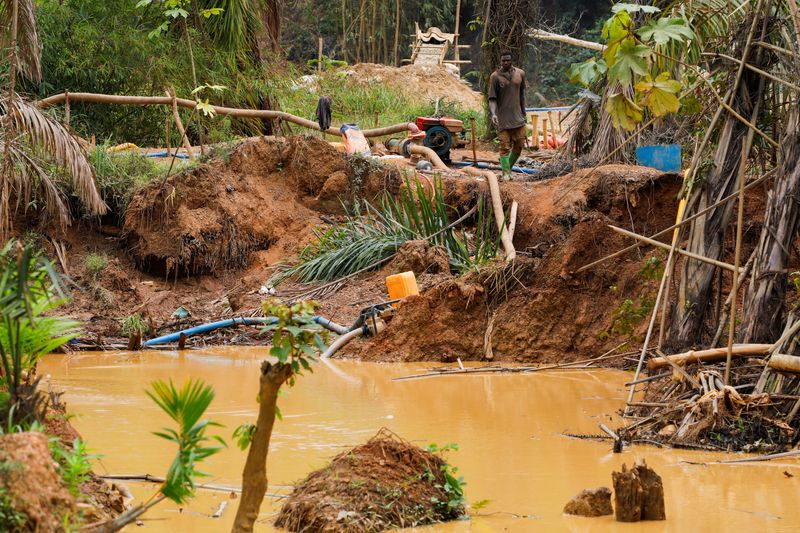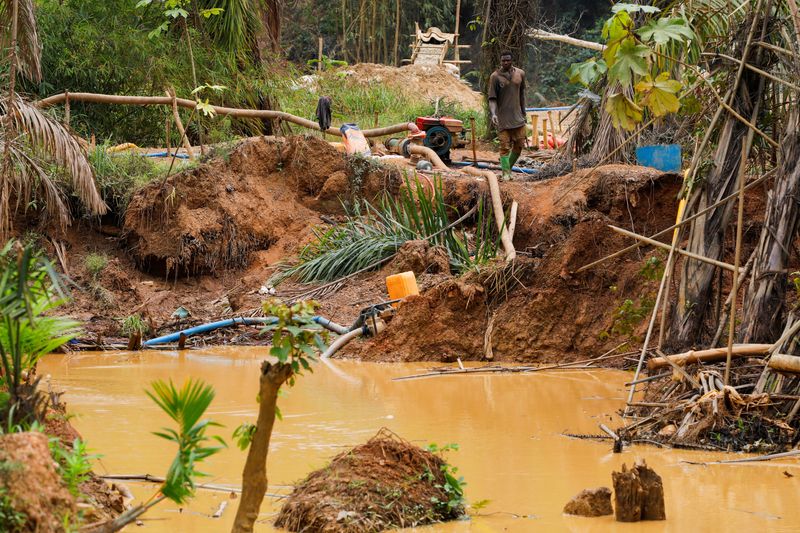Commodities
Ghana’s wildcat gold mining booms, poisoning people and nature

By Maxwell Akalaare Adombila
PRESTEA-HUNI VALLEY, Ghana (Reuters) – At an unlicensed gold mine in Ghana, men in t-shirts, shorts and rubber boots wade through pools of muddy water laced with mercury, pull out rocks with bare hands and operate a rickety sluice as they search for the precious ore.
The ramshackle mine is part of a booming business that is generating livelihoods and informal revenue streams for Ghana’s economy, even as it harms miners’ health, pollutes waterways, destroys forests and cocoa farms, and fuels crime.
“It’s risky but I just want to survive,” said one of the men at the wildcat site visited by Reuters in the Prestea-Huni Valley district in western Ghana.
The 24-year-old accounting student, who asked not to be named because he was involved in illegal activities, said he had been skipping classes to prospect for gold because he needed the money, having lost his father as a teenager.
There was no professional protective equipment at the mine. Men wore flimsy plastic shopping bags on their heads. One had swimming goggles and another a rice bag covering his torso.
The unlicensed gold mining industry, known in Ghana as “galamsey”, has grown at a breakneck pace this year as global gold prices have risen by almost 30%, enticing new entrants.
Small-scale mines produced 1.2 million ounces of gold in the first seven months of this year, more than in the whole of 2023, according to data from Ghana’s mining sector regulator.
About 40% of Ghana’s total gold output comes from small mines, as opposed to concessions operated by multi-national firms. Some 70-80% of the small mines are unlicensed.
POISONED PROFITS
Martin Ayisi, head of Ghana’s Minerals Commission, the mining industry regulator, said most galamsey gold was smuggled out of the country and was therefore not contributing to national gold export revenues.
For Ayisi, the rise in gold prices is good for Ghana, helping it recover from a severe economic crisis in 2022 that required a $3-billion IMF bailout.
“We should be able to get a lot of money and probably exit the IMF programme earlier,” he said, forecasting national gold export revenues would more than double to $10 billion this year.
But industry experts say the lines between legal mining and galamsey are blurred, and gold from informal mines represents a larger proportion of revenues than the authorities acknowledge.
The dangers of galamsey, however, are not in dispute.
Dozens of miners have been killed in collapsing pits in recent years, according to news reports and human rights groups, while hospitals and health centres report high numbers of early deaths from pulmonary diseases of miners and residents of towns and villages near mines.
These are caused by inhaling dust that contains heavy metals such as lead, as well as poisonous fumes from the mercury and nitric acid the miners use to leach gold out of sediment.
The chemicals are then dumped on the ground or in rivers. Ghana’s water authority says mercury and heavy metals from mining have contaminated about 65% of water sources.
Meanwhile, thousands of hectares (acres) of cocoa plantations and virgin forest have been destroyed by illegal miners, according to data from Global Forest Watch, an online monitoring platform.
Protesters have taken to the streets in Accra in recent weeks to criticise President Nana Akufo-Addo’s government over what they saw as its failure to tackle these problems. “Leaders, you’ve failed us!” read some of the placards.
“Galamsey has to stop. We want to live long. We don’t want to fall sick. We don’t want to go to the hospital,” said Aboubacar Sadekh, who was taking part in a march on Sept. 22, draped in a Ghanaian flag.
The government denies that it is failing to act on galamsey. When he came to power in 2017, Akufo-Addo pledged to take action on the issue, and during his time in office the government has launched crackdowns, deploying soldiers to arrest illegal miners. In some cases, mining equipment was seized and destroyed.
ORGANISED CRIME
Opinion polls suggest galamsey is one of the top five issues for voters ahead of a Dec. 7 general election.
The main candidates to replace outgoing Akufo-Addo as president, Vice President Mahamudu Bawumia and former President John Mahama, have pledged to formalise galamsey, for example by funding a state agency to explore for gold and map areas for locals to mine.
But successive governments have been promising for years to tackle the problem without making much headway, partly because powerful people are benefitting from the industry, experts say.
Chris Aston, head of a British-backed programme aimed at regulating small-scale gold mining in Ghana, said artisanal miners were vulnerable to organised crime gangs, who provide them with funding for equipment up-front, unlike other lenders.
“Miner pre-financing is one way that organised crime groups can penetrate the gold supply chain,” he said. Funders then “require miners to sell the gold they mine back to them at a subsidised rate”.
Emmanuel Kwesi Anning, a security consultant based in Accra, said galamsey was fuelling an increase in gun-trafficking because those overseeing illegal mines sought armed protection against rivals or thieves.
He also said politicians and traditional rulers in some areas were taking a cut of galamsey profits, further entrenching the problem.
“It has become an elite consensus that they’ll not touch this business.”

Ghana’s information minister did not respond to requests for comments on the allegations of organised crime involvement, gun running and corruption.
A top official in the National Security Ministry, who did not wish to be named because they were not authorised to speak about the issue in public, said authorities were working to address the links between illegal mining, money laundering and gun trafficking.
Commodities
Oil prices rise; U.S. crude inventories plunge, Russia-Ukraine truce eyed
Commodities
India’s Reliance to stop buying Venezuelan oil over US tariffs, sources say
Commodities
Oil prices climb on Venezuela supply worries

 Forex3 years ago
Forex3 years agoForex Today: the dollar is gaining strength amid gloomy sentiment at the start of the Fed’s week

 Forex3 years ago
Forex3 years agoUnbiased review of Pocket Option broker

 Forex3 years ago
Forex3 years agoDollar to pound sterling exchange rate today: Pound plummeted to its lowest since 1985

 Forex3 years ago
Forex3 years agoHow is the Australian dollar doing today?

 Cryptocurrency3 years ago
Cryptocurrency3 years agoWhat happened in the crypto market – current events today

 World3 years ago
World3 years agoWhy are modern video games an art form?

 Commodities3 years ago
Commodities3 years agoCopper continues to fall in price on expectations of lower demand in China

 Economy3 years ago
Economy3 years agoCrude oil tankers double in price due to EU anti-Russian sanctions























